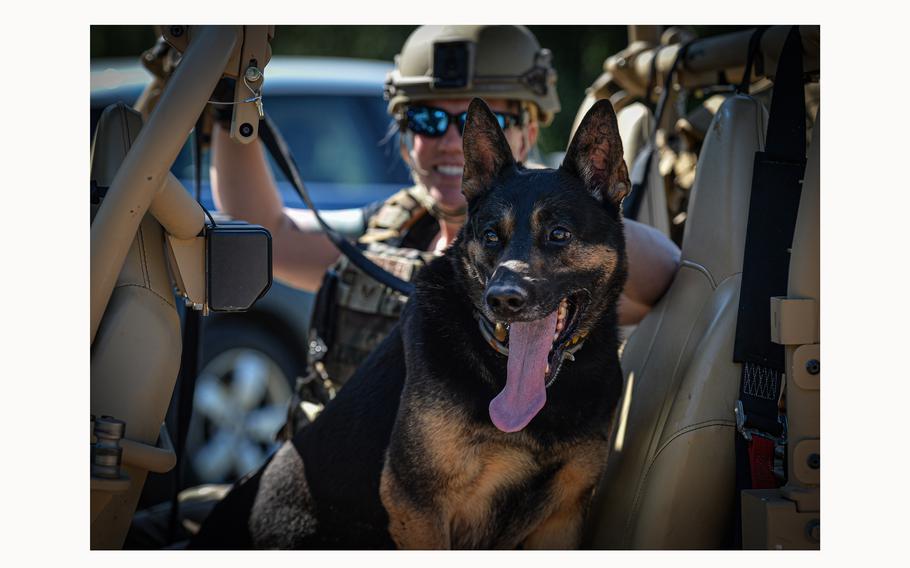
Air Force Staff Sgt. Shanna McCarter and her dog Mojito take a break in the shade between training sessions at Spangdahlem Air Base, Germany, on June 26, 2024. McCarter is a military working dog handler with the 86th Security Forces Squadron at Ramstein Air Base. (Alexander Riedel/Stars and Stripes)
SPANGDAHLEM AIR BASE, Germany — Language barriers melted away amid barks and tail wags, as military and police teams of handlers and their dogs showcased their skills in Germany this week.
The event Wednesday, orchestrated by the 52nd Security Forces Squadron, drew 25 participating teams from Germany, Luxembourg and the United States for a day-long training.
Each team worked through scenarios such as routine traffic stops, drug and explosive searches, and apprehension of suspects.
“Just watching a team run through a drill will tell you everything,” said U.S. Air Force Tech. Sgt. Chris Fitchett, 52nd Security Forces Squadron kennel master at Spangdahlem and the event’s lead planner.
“You get to see how they problem solve, how they run patrol work, bite work or detection, (and) their tactics,” Fitchett said. “You learn so much and it makes everyone better in the process.”
One of the most demanding stations took place inside a blacked-out base theater. Handlers used night vision goggles and communicated with their dogs to find hidden mock explosives.
“It challenges you to work with voice commands and listen to your dog,” said German army Master Sgt. Ole R. of the 8th Military Police Company in Mainz, whose full name was not shared due to German military security regulations. “You have to train that much more intensely, and it’s not something we do regularly.”
Another station involved the classic police task of tracking down a person hiding in a building, primarily aided by the canine knack for scent detection.
“It’s all about seeing the change of behavior in the dogs,” said U.S. Army Sgt. Aaron Vinson, who is stationed in Baumholder with the 100th Military Police Detachment. “Sometimes it can be minute changes. But it’s important that the handler sees that change and reacts to it properly.”
In a simulation of road clearing operations, dogs and handlers faced the challenge of detecting buried scents and mock roadside bombs, a scenario that leaned heavily on lessons learned from deployments in Iraq and Afghanistan.
“The training is equally rigorous to ours, but the focus areas are quite different,” said Dennis Heinz, a German police officer from nearby Trier. “The task spectrum for the military dogs is far wider than I imagined. What these teams deliver in service of a defense mission is quite spectacular.”
The relationship between a handler and their dog is crucial for safety and success under such stressful conditions, Fitchett said.
“You come in on your off time to build that relationship,” Fitchett said. “That’s what this job takes, someone who is willing to sacrifice to take care of their dog. Ultimately, then you get to be a good team and an asset to the mission.”